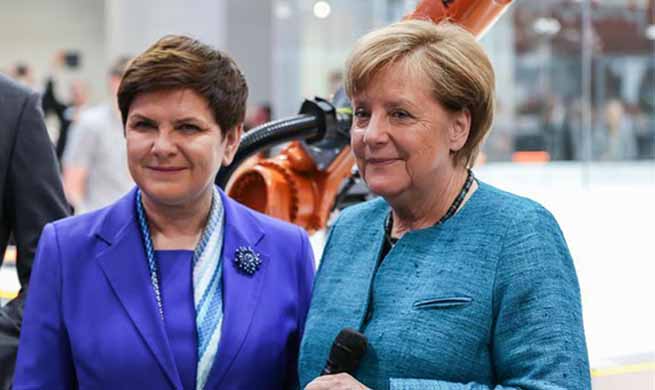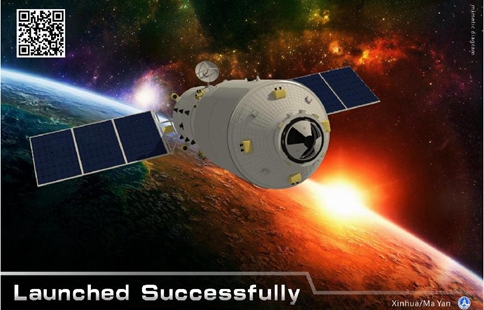By Osama Radi and Emad Drimly
RAMALLAH, April 24 (Xinhua) -- Palestinian President Mahmoud Abbas will meet with U.S. President Donald Trump next week in Washington. Palestinian analysts say the meeting shows U.S. consistent efforts to resume the stalled peace process between Israelis and Palestinians.
According to analysts, Trump may outline the U.S. vision for the future of the peace process, which may bring Israelis and Palestinians back to direct talks despite no permanent peace agreement.
On Sunday, a Palestinian official delegation arrived in Washington to prepare for the meeting scheduled for May 3. It will be the first meeting between the two presidents since Trump took office in January.
Last week, Nabil Abu Rudeineh, an aide to Abbas, announced that the Palestinian president will express to Trump his commitment to just and comprehensive peace and security in the region and the entire world.
"Abbas looks for a positive meeting with President Trump," he said.
In fact, the U.S. efforts to restart the regional peace process were demonstrated earlier this year. Before meeting with Abbas, Trump held separate meetings with Israeli Prime Minister Benjamin Netanyahu, Egyptian President Abdel Fattah al-Sisi and King Abdullah II of Jordan.
Samih Shbeib, a West Bank political analyst, told Xinhua that President Trump will listen to President Abbas and present his vision on resuming the peace process.
However, the meetings between Trump's Administration and major Middle East parties, mainly those seeking to mediate the Palestinian-Israeli conflict, did not go beyond the stage of thinking about, listening to and understanding views, Shbeib said.
The analysts believe that the United States hopes to settle the Israeli-Palestinian conflict, the core regional issue, but they say it isn't an easy mission.
The last U.S.-sponsored peace talks between Israel and the Palestinians broke down in April 2014, after nine months without any breakthrough because of deep disputes between the two sides over settlement buildings and the recognition of the borders of a Palestinian state.
Khalil Shahin, another West Bank political analyst, said he expects the Trump Administration to persuade Abbas to hold direct meetings with Israel.
"The U.S. administration is certainly going to exert pressure on the Palestinians in order to make its efforts to resume the stalled peace process successful," said Shahin. "The U.S. may threaten to cut its financial aid to the Palestinians in case Abbas refuses to resume talks with Israel."
According to Abbas, Israel must fulfill its commitments to the Palestinians before a meeting with Netanyahu to discuss permanent status questions.
"We are demanding from the Israeli side to stop the illegal settlement on our Palestinian lands and release our prisoners," Abbas said in Ramallah last September.
In a February meeting in Washington, Israeli Prime Minister Netanyahu tried to convince Trump that Israeli settlement can never be an obstacle to peace with the Palestinians.
According to the prime minister, the settlement is not the core of the conflict, but an issue that needs to be resolved during peace negotiations.
"I expect that President Abbas will show little flexibility in dealing with President Trump's vision for making peace in the Middle East," said Shahin.
"The U.S. vision might be closer to the Israeli vision. Peace can be resumed, but reaching a permanent agreement is ruled out," he explained.
In the view of Hani al-Masri, also a Palestinian political analyst from the West Bank, President Abbas would be under pressure from the new U.S. vision in Washington given the weak ability to bargain on the Palestinian side.
"Abbas will meet Trump amid a weak and bad Palestinian position, mainly a deep internal division between the West Bank, ruled by Abbas, and the Gaza Strip, ruled by Hamas, which has been going on since 2007," said al-Masri.
The current weakness in the Arab world and the violence that the region is witnessing "would certainly weaken Abbas' position before President Trump. Palestinian demands won't be influential and the chance of getting positive results in Washington could be slim," the political analyst added.
In his opinion, considering the weak position, it wouldn't be a good idea for the Palestinian leadership to accept a peace arrangement.
He called on the Palestinians and their leaders "to stick to a united position of rejecting a weak peace process without a mechanism seeking a fair solution to the Palestinian cause."

















